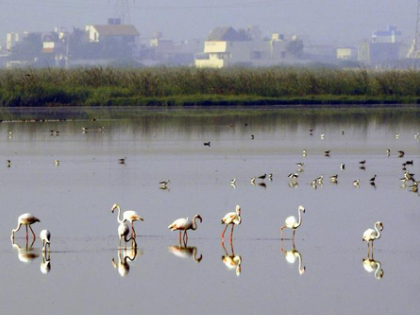Chennai’s last wetland Pallikaranai marsh to get stringent protection after NGT crackdown
By IANS | Updated: October 1, 2025 13:10 IST2025-10-01T13:08:32+5:302025-10-01T13:10:09+5:30
Chennai, Oct 1 In a landmark move aimed at protecting Chennai’s last surviving natural wetland, the National Green ...

Chennai’s last wetland Pallikaranai marsh to get stringent protection after NGT crackdown
Chennai, Oct 1 In a landmark move aimed at protecting Chennai’s last surviving natural wetland, the National Green Tribunal (NGT) has ordered an immediate freeze on all planning permissions and construction approvals in and around the Pallikaranai Marsh.
The tribunal’s order, delivered recently, directs every key agency -- including the Chennai Metropolitan Development Authority (CMDA), Greater Chennai Corporation (GCC), the state environment department, and the Tamil Nadu State Wetland Authority -- to halt approvals until the marsh’s boundaries and buffer zones are scientifically mapped and incorporated into the upcoming third master plan for Chennai.
The NGT bench underscored that unchecked urbanisation had already reduced the Ramsar Site from nearly 6,000 hectares to just about 1,200 hectares, worsening the city’s flood vulnerability. It also recorded that around 50 stormwater inlets currently discharge directly into the marsh.
Hydrologists said the marsh acts as a critical flood sink for southern Chennai, receiving water from upstream lakes in Pallavaram, Keelkattalai, and Narayanapuram via the Radial Road, as well as from areas along Old Mahabalipuram Road (OMR).
Experts noted that if the government wants to improve water retention, it should reclaim the bio-mined dumpyard within the marsh and deepen it.
“They must carry out studies to understand the depth of waste beneath the surface. This has to be excavated and turned into a catchment area,” said a senior environmental activist from Chennai.
Though over 70 per cent of the 30 lakh tonnes of legacy waste has been bio-mined, GCC still dumps about 3,000 tonnes of fresh waste into the site.
GCC Commissioner J. Kumaragurubaran said efforts were underway to divert fresh waste from the marsh.
“We plan to set up a 1,000-tonne windrow composting centre and send 1,500 tonnes of waste daily to the upcoming waste-to-energy plant at Venkatamangalam. Around eight lakh tonnes of waste have been bio-mined in the past three years,” he said.
Environment Secretary Supriya Sahu said boundary walls spanning eight km have already been built to demarcate and protect the marsh while allowing natural water flow.
“A dedicated monitoring committee has been formed to enforce the NGT order, and invasive water hyacinth is being cleared to increase storage capacity,” she added.
Environmentalists said the order is a “last chance” for Chennai to restore its vital wetland and demanded strict enforcement against illegal encroachments.
Disclaimer: This post has been auto-published from an agency feed without any modifications to the text and has not been reviewed by an editor
Open in app